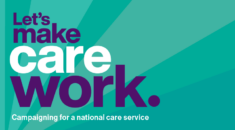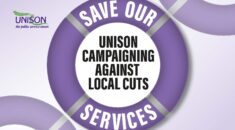Adult social care is in crisis, but UNISON has a solution.
This week newspapers have been covering our report suggesting the chancellor uses the £2.4bn extra that will be added to its business rates surplus next year to ease the social care funding crisis.
But what does that mean for you?
The government expects to receive a £2.4bn windfall from business rates in England next year, and for the two following years.
This is because it now receives more in business rates from English local authorities* than it pays out to them in revenue support grant and this £2.4bn growth in business rates ‘surplus’ has yet to be allocated for specific spending by ministers
UNISON’s report Investing in Social Care says that nvesting it in social care would be the best possible use of the money for those in need of support, the homecare workforce and the NHS.
Cuts to local government spending have meant a reduction in older people receiving homecare, a fall in the number of day care places and in meals-on-wheels services, all of which is putting huge pressure on the already stretched NHS.
UNISON’s Save Our local Services campaign
Local council taxpayers would also benefit. If local authorities in England were given an extra £2.4bn, it would remove the need for the two per cent social care council tax precept.
Last April, English councils were allowed to raise extra cash from council taxpayers to spend on social care. But this money doesn’t go where it is needed most, and elderly people in deprived areas lose out.
To find out exactly how much extra money your local council would get for social care next year if the government accepted UNISON’s proposal, and how much local taxpayers would save by not raising another 2% on council tax, click on the map below.
UNISON general secretary Dave Prentis said: “The social care system is in dire straits. There’s simply not enough money to fund the care that’s needed.
“The losers are the thousands of dedicated homecare workers, who work long hours, and whose already low wages are dragged below the legal minimum because of the non-payment of travel time.
“Those suffering the most are the elderly and the disabled, who rely on daily visits so they can stay in their own homes.
“Visits are often too short to administer the care needed, or care packages simply aren’t available. Then people have to stay in hospital far longer than is good for them, in beds that are desperately needed for other patients.
“Investing £2.4bn in social care would be money extremely well spent. Not only would it mean better care for the elderly, it would ease the pressure on homecare staff, and free up beds in the NHS.”
*This is only applies in England because there is no central surplus of business rates in Wales or Scotland.




